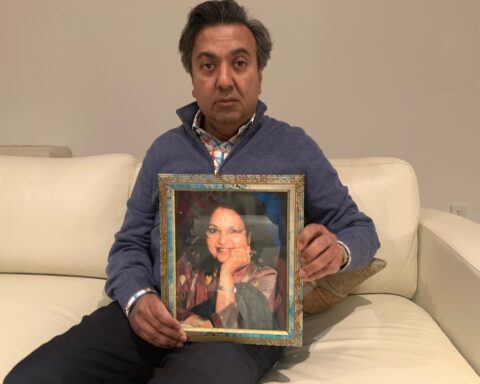At least one Canadian is on a so-called global hit list of bloggers put out by Bangladeshi jihadist group Ansarullah which has vowed to take action against those it deems to have denigrated Islam.
The group named Raihan Abir editor of the Bengali-English blog Mukto-Mona, which has other Canadian contributors writing under pseudonyms among its stable of 300 writers from around the world.
Mukto-Mona started as an online discussion circle, but has now evolved into a social movement through blogs, activism and research. In English, the literal dictionary translation of “Muktomona” is freethinker.
Prominent in the list is Bengali author Taslima Nasreen, who is presently staying under police protection in India, after fleeing Bangladesh 21 years ago in the face of death threats and fatwas from fundamentalists.
The list includes names of Abdul Ghaffar Choudhury (London), Dawood Haider (Germany), Banya Ahmed (US), Asif Mohiuddin (Germany), Ananya Azad (Germany), Omer Farooq Luqs (Germany), Farzana Kabir Khan (Germany), Naastiker Dharmakatha (Germany), Foring Camelia (Germany), Qamrul Hassan (London), Sushanta Dasgupta (London), Arifur Rehman(london), Ajanta Debroy (London), Maneer Hassan (Birmingham), Shantanu Adeeb (London), Nijhoom Majumdar (London), Rumala Hashem (London), Raihan Abir (Canada) and Nirjhar Majumdar (Sweden).
There have been reports in the media recently that Ansarullah activists are trying to cross over from Bangladesh to India to target Taslima Nasreen.
At the bottom of the list, the extremist group Ansarullah has issued the following chilling threat: “Enemies of Islam and madrassa education, atheists, anti-Islamic apostates, Shahbagi bloggers, acting on behalf of India, are trying to set obstacles in the path of establishment of Islamic caliphate. We demand that the Bangladesh government cancel the citizenship of such enemies of Islam, otherwise we will liquidate them wherever we find them across the world. Our jihad will continue, Inshallah. Amen. – Ansarullah Bangla Team”.
There have been reports in the media recently that Ansarullah activists are trying to cross over from Bangladesh to India to target Taslima Nasreen.
Ansarullah believes in the ideology of Anwar Al-Awlaki, a Yemen-based al-Qaeda activist, and has been involved in the gruesome murders of at least four Bangladeshi freethinkers and bloggers including US-based Bengali writer Avijit Roy and blogger Washiqur Rahman.
Taslima Nasreen tweeted: “Ansarullah Team that killed B’deshi atheist bloggers just published global hit list of bloggers. My name is in the list.” She has attached the photo of the hit list.
Police have linked Ansarullah Bangla Team to the recent murders of five secularist bloggers in Bangladesh, and arrested seven of its members, Dhakar police joint Commissioner Monirul Islam said.
He said there was little threat to society within Bangladesh, where more than 90 per cent of the 160 million people are practising Muslims, Asia Times reported.
Fear for the future
Many intellectuals, especially among the Bangladeshi diaspora, do fear for the future however, and worry that the South Asian country could be seen as a safe destination for radical Islamists if the blogger killers are not caught and prosecuted.
Four of the bloggers were killed this year alone.
Bangladeshi-born U.S. writer Avijit Roy was hacked to death by unidentified assailants on February 26 when leaving a university book fair in Dhaka with his wife.
Oyeshekur Rahman Babu, an atheist writer, was chopped to death in central Dhaka on March 30, after he criticized Islam, followed by the killing of science writer Ananta Bijoy Das in a similar attack in the north-eastern city of Sylhet on May 12.
The government of Prime Minister Sheikh Hasina, who campaigns for secularism beside Islam as a state religion, was criticized for requesting local bloggers and activists “not to cross the limit” over sensitive religious issues after blogger Niladri Chattapadhay was killed in another gruesome murder in Dhaka on August 7.
Writers around the world chime in
For critics, the government’s stance seems like double standards.
More than 150 writers from around the world, including Canada, issued an open letter this week to the Bangladeshi government after the killing of Ananta Bijoy Das.
[F]reedom of expression is a fundamental right under Bangladesh’s constitution and one of the rights under the Universal Declaration of Human Rights.
The writers including Salman Rushdie, Margaret Atwood, Yann Martel and Colm Tóibín, in the letter said freedom of expression is a fundamental right under Bangladesh’s constitution and one of the rights under the Universal Declaration of Human Rights.
It called Bangladesh to provide protection and support to bloggers and other writers at risk in the South Asian country in line with Bangladesh’s obligations under national and international laws.
Lux said the death list was nothing new, and warned that the extremists could also strike others.
Like others who received it by email, he has taken precautions, he said, and is under German police protection.
The role of the government
Religion and secularism have frequently clashed in Bangladesh’s recent history.
Secularism was one of the basic principles of Bangladesh’s constitution when the Muslim-majority part of the then Pakistan (East Pakistan) became independent after a bloody war in 1971.
Whatever the official status of Islam, the individual’s freedom of expression must be protected, says Arifur Rahman, a writer living in London.
But military-chief-turned-president Ziaur Rahman began the process of Islamizing the constitution after the assassination of Bangladesh’s founding president Sheikh Mujibur Rahman in 1975. Ziaur Rahman gave way to the Islamists, especially the Jamaat-e-Islami party which opposed Bangladesh during the war.
Military dictator Hussein Muhammad Ershad, who took over shortly after Ziaur Rahman’s murder in 1981, formalized Islam as the state religion in 1988.
Prime Minister Sheikh Hasina, Mujibur Rahman’s daughter, brought back secularism in the constitution in 2011, while keeping Islam as the state religion.
With the political stakes high in Bangladesh’s sharply divided politics, analysts say Hasina would never put her popularity at risk by repealing the state religion.
Whatever the official status of Islam, the individual’s freedom of expression must be protected, says Arifur Rahman, a writer living in London.
The government had a duty to “create an atmosphere where everyone can express their opinion without fear,” he said.
Re-published in partnership with Asian Pacific Post.




